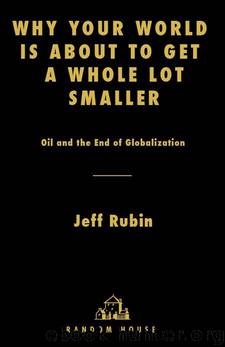Why Your World Is About to Get a Whole Lot Smaller by Jeff Rubin

Author:Jeff Rubin [Rubin, Jeff]
Language: eng
Format: epub
Publisher: Random House Publishing Group
Published: 2011-03-29T17:29:18.034000+00:00
ROUGH SEAS
Container ships are the pack horses of global trade. You’ve seen them—the colossal oceangoing ships with what look like gigantic Lego blocks stacked on the decks. Inside those boxes are the fruit of globalization: all the things that are made on one side of the world and sold on the other. These floating warehouses run on the scrapings found at the bottom of a barrel of oil, an increasingly valuable gunk known as “bunker fuel.”
The massive trend toward containerization has sobering implications for the future of global commerce. If anything, the world trade system may be even more vulnerable to soaring oil prices today than it was back in the 1970s. Recent changes in shipping technology have made transoceanic freight costs much more sensitive to oil prices than they were in the time of the OPEC shocks, suggesting we will see an even greater impact on world trade than occurred back then.
Container ships can be unloaded much faster than bulk cargo ships, so they spend much more time at sea than in port. An average commercial transport ship now spends 85 percent of its time at sea compared to 55 percent only fifteen years ago. During those years, the share of cargo shipped by container has risen from 35 to 75 percent.
Greater speed has also made shipping costs more sensitive to fuel prices. The shift to container ships has increased the importance of ship speed since they spend much more time at sea than at port. Over the past two decades, container ships have been built to go faster than bulk cargo ships, and since container ships have steadily replaced bulk ships, the world’s fleet speed picked up.
But greater speed requires greater energy. In global shipping, the increase in ship speed over the last fifteen years has doubled fuel consumption per unit of freight—another head fake from the efficiency paradox.
That means that fuel costs have steadily risen as a share of total freight costs. As oil climbed to $100 per barrel, fuel costs became almost half of the total cost of shipping something by sea. The implication for the future is clear. There is a direct link between transport costs and every increase in world oil prices. Higher oil costs translate directly into higher shipping costs, often through what is called the Bunker Adjustment Factor, which adds the increases in oil prices directly to the shipping bill. The increase in oil prices from $30 per barrel to $100 per barrel raised the average daily fuel bill of a cargo ship from $9,500 to $32, 000.
Chinese exporters to America have faced particularly steep increases. The transpacific bunker charge, a benchmark fuel surcharge on freight from China, rose from $455 to over $1,100 on a standard 40-foot container between January 2007 and 2008. As the price of oil goes higher, China becomes a costlier and costlier place to get your stuff from.
And those costs will in turn be absorbed in the prices of whatever you are buying at Wal-Mart or Tesco or whatever the high-volume, low-price, big-box purveyor of foreign-made goods is where you live.
Download
This site does not store any files on its server. We only index and link to content provided by other sites. Please contact the content providers to delete copyright contents if any and email us, we'll remove relevant links or contents immediately.
The Meaning of the Library by unknow(2564)
Six Billion Shoppers by Porter Erisman(2296)
Why Nations Fail: The Origins of Power, Prosperity, and Poverty by Daron Acemoglu & James Robinson(2285)
No Time to Say Goodbye(2112)
Red Notice by Bill Browder(2070)
Currency Trading For Dummies by Brian Dolan(1921)
The Economist [T6, 22 Thg9 2017] by The Economist(1916)
Thank You for Being Late by Thomas L. Friedman(1766)
Bitcoin: The Ultimate Guide to the World of Bitcoin, Bitcoin Mining, Bitcoin Investing, Blockchain Technology, Cryptocurrency (2nd Edition) by Ikuya Takashima(1694)
Amazon FBA: Amazon FBA Blackbook: Everything You Need To Know to Start Your Amazon Business Empire (Amazon Empire, FBA Mastery) by John Fisher(1559)
Coffee: From Bean to Barista by Robert W. Thurston(1539)
The Future Is Asian by Parag Khanna(1480)
The Great Economists by Linda Yueh(1453)
Grave New World by Stephen D. King(1418)
How Money Got Free: Bitcoin and the Fight for the Future of Finance by Brian Patrick Eha(1418)
Pocket World in Figures 2018 by The Economist(1414)
Capitalism Without Capital: The Rise of the Intangible Economy by Jonathan Haskel(1391)
The Sex Business by Economist(1378)
Cultural Intelligence by David C. Thomas(1286)
